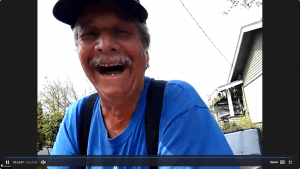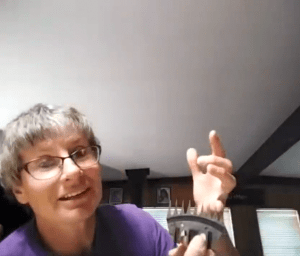As part of OFN’s statewide survey, graduate students from UO’s Folklore and Public Culture Program shadow professional researchers in the field. This serves OFN’s broader mission to educate, train, and prepare the next generation of public folklorists. Read their reflections on conducting fieldwork during the pandemic.
by Robert Bishop & Taylor Burby
Robert: This internship has been quite different from the ones of the past. Previously, the two interns and teacher would venture out in the field to interview folks over the weekend and take time to observe, gather, and experience the lives and traditions they help document. This time though, we watched from home. It is odd to think that I have never actually been in the field or even on campus much at all because the majority of my time at the University of Oregon has been during the COVID-19 pandemic. Instead, I have worked on other skills throughout my zoom term. Practicing researching, organizing, writing, archiving, and so on and so forth.

Knute Nemeth having a laugh while talking about the wonders of tuna fish
I sat in on three interviews with Riki Saltzman taking notes so that I could adopt her methods to my own interview that would never come. But that is the name of the game, you don’t always get the interview or the information you’re chasing. So, you pivot like we all have done in the last twelve months during the Year of the Great Pivot. Of the interviews I sat in on, the one that stuck out the most was with a fisherman named Knute Nemeth. He has been working on or near the water his whole life and says, “I like fishing because you’re getting your hands wet and you feel like you’re communing with the ocean and Mother Nature. You’re right on the level there. I mean, physically, literally right on the level of the ocean. And it’s all raw and it just there’s just something about it.” He laughed and pondered and reflected about life out on the wild blue yonder, using words and phrases that made little sense to someone from a landlocked Midwestern state like myself. Knute talked to us for over an hour about various ways to catch fish, how he survived a shipwreck, what he looks for in a ship captain, and how he and his buddy became famous at Burning Man for bringing top-notch tuna year in and year out. While watching Knute tell stories I got somewhat lost in his jovial character and envisioned him to be Oregon’s answer to Long John Silver but with both of his legs intact.
Taylor: Similarly, to Robert’s sentiment, this internship with the OFN was different from those in terms prior, and even so, an invaluable experience. I, too, sat in on Riki’s Zoom interviews and noted which of her methods I have lacked during those I have given previously, namely for my thesis work. One such methods was her ability to rein in the conversation if they became too off-topic. Another, which I occasionally struggle with, was her ability to ask follow-up questions that directed the conversation towards uncovering stories that truly highlighted the essence of the interviewee’s experience. These were two skills I focused on developing during my interview with sheep shearer, Wendy Valentine.

Wendy Valentine displaying tools of the sheep shearing trade
I never thought I would take a special interest in the subject of sheep shearing, but Wendy really sold me when she had her daughter set the laptop on the ground and act as a sheep stand-in so that Wendy could demonstrate the process of shearing for me. When I later asked why she sheared, Wendy first joked that she was “too stupid to do anything else” (I snorted!). Her following response, however, suggested to me that shearing was more than wrangling a couple hundred 250-500 lb sheep in an eight hour day, getting bitten by a sheep and chasing it from the barn while wielding a hammer (she never caught it), or handling equipment that could cut skin or knock out teeth. Rather, at the heart of shearing is the ability to nurture one’s community, teach about animal welfare, and build multi-generational relationships. As noted by Wendy, this includes “watching children pick up where older generations have left off in ranching and farming.” Wendy herself is a fourth-generational shearer and stated that, at this point, her family must have lanolin (wool wax) in their blood. The opportunity to meet and make a connection with Wendy (and her daughter!), and I look forward to the potential of traveling down to Langois so I can get bitten by a sheep myself.
This internship turned a difficult situation into a great term of study for two future folklorists. We have enjoyed having extra time to work on the project and it has shown us that when one path is blocked, we can always take another, learning more than we thought along the way.